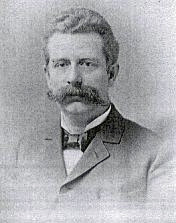
- Chess World Cup
- FIDE Grand Prix
- Olympiad
- World Championship
- List of strong tournaments
- List of world championships

- Checkmate patterns
- Chess openings
- Chess strategy
- Chess tactics
- Chess theory
- Endgames
- Pawn structure
- Problems/Compositions












 Jackson Showalter
Jackson ShowalterJackson Whipps Showalter (February 5, 1859, Minerva, Kentucky - February 5, 1935, Lexington, Kentucky) was a five-time U.S. Chess Champion: 1890, 1892, 1892-1894, 1895-1896 and 1906-1909.
Showalter won U.S. Championship matches against Max Judd (1891/92, +7-4=3), Albert Hodges (1894, +7-6=4), S. Lipschütz (1895, +7-4=3), Emil Kemény (1896, +7-4=4), and John Finan Barry (1896, +7-2=4). He lost championship matches to Max Judd (1890, +3-7=0), S. Lipschütz (1892, +1-7=7), Albert Hodges (1894, +3-5=1), Harry Nelson Pillsbury (twice, 1897 (+7-11=3) and 1898 (+3-7=2), and Frank Marshall (1909, +2-7=3).
Other match results: William H.K. Pollock (1891, +3-2=3), Emanuel Lasker (1892/93, +2-6=2), Jacob Halpern (1893, +5-3=1), Adolf Albin (1894, +10-7=8), Dawid Janowski (four times: 1898, +2-7=4; 1899, +4-2=0 and +4-2=1; 1916, +2-7=2), Borislav Kostic (1915, +2-7=5), and Norman T. Whitaker (twice: 1916, +6-1=0 and 1918, +1-4=3).
Tournament record: Cincinnati 1888, +8-0=2, first place; New York 1889, +15-17=8, ninth (Chigorin and Weiss won; the first draw in the second round did not count and had to be replayed); St. Louis 1890, +11-0=1, first; Chicago 1890, +13-1=0, first; Lexington 1891, +5-1=0, first; New York 1893 (Impromptu), +7-4=2, third (Em. Lasker won); New York 1893 (N.Y.C.C.), +5-3=1, third (Pillsbury won); New York (NYSCA) 1894, +3-0=1, second (Hodges won); Buffalo 1894, +3-1=2, first; New York 1894 (2nd City Chess Club Tournament), +5-3=2, third (Steinitz won); New York (NYSCA) 1895, +3-0=1 (second, D. G. Baird won); Brooklyn CC championship 1895/96, +3-1=0, withdrew after four rounds (Hermann Helms won); Nurenberg 1896, +3-10=5, sixteenth (Em. Lasker won); New York (NYSCA) 1898, +1-1=1, seventh (Koehler won); Vienna 1898, +12-16=6, fourteenth (Tarrasch won); Cologne 1898, +8-5=2, sixth (Burn won); London 1899, +7-10=9, eighth (Em. Lasker won); Paris 1900, +8-6=5, tenth (Em. Lasker won; the first draw did not count and had to be replayed); Munich 1900, +7-7=1, seventh (Pillsbury and Schlechter won); New York 1900, +6-2=2, second (Lipschütz won); Cambridge Springs 1904, +4-2=9, fifth (Marshall won); Excelsior 1915, +9-1=0, first; Tampa 1916, +3-4=2, second (W. Moorman won); Chicago 1916, +14-1=2, second (Ed. Lasker won); Lexington 1917, +4-3=1, second (Ed. Lasker won); Chicago 1918 +4-6=1, ninth (Kostic won); Cincinnati 1919, +6-3=1, fourth (Ed. Lasker won); Louisville 1922, +7-2=2, fourth (Factor won); Chicago 1926, +2-8=2, twelfth (Marshall won).
He was known as "the Kentucky Lion" after his birthplace and his hairstyle, which consisted of a thick mane down the back of his neck, and perhaps also his playing strength.
A variation of the Queen's Gambit Accepted is named after him (1. d4 d5 2. c4 dxc4 3. Nc3).
The famous "Capablanca Simplifying Manoeuvre" in the Orthodox Variation of the Queen's Gambit Declined (1.d4 d5 2.c4 e6 3. Nc3 Nf6 4. Bg5 Be7 5. e3 Nbd7 6. Nf3 0-0 7. Rc1 c6 8. Bd3 dxc4 9. Bxc4 Nd5) had in fact been used by Showalter in the 1890s, many years before José Raúl Capablanca played it.